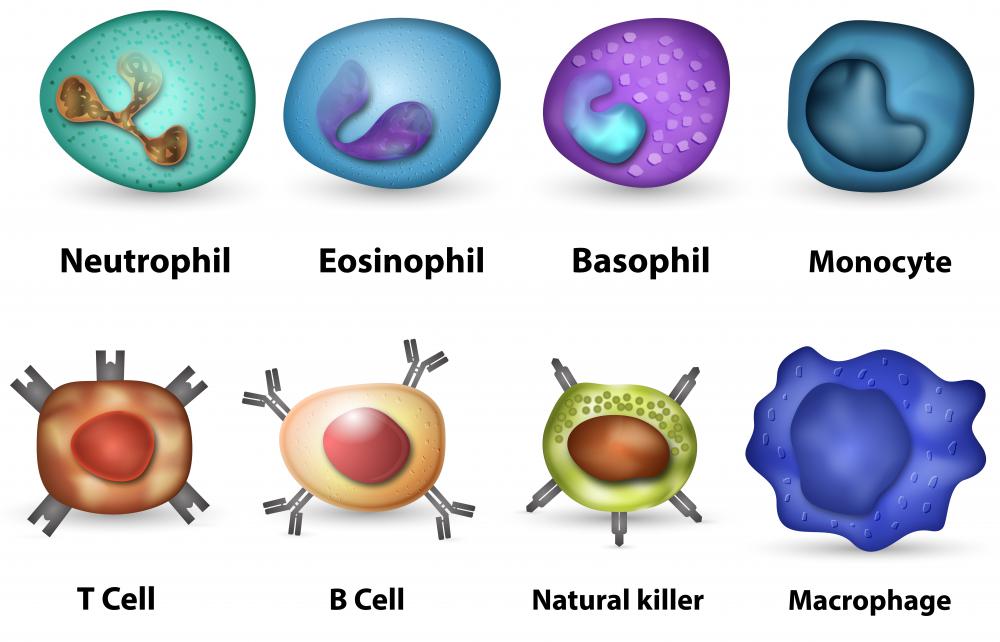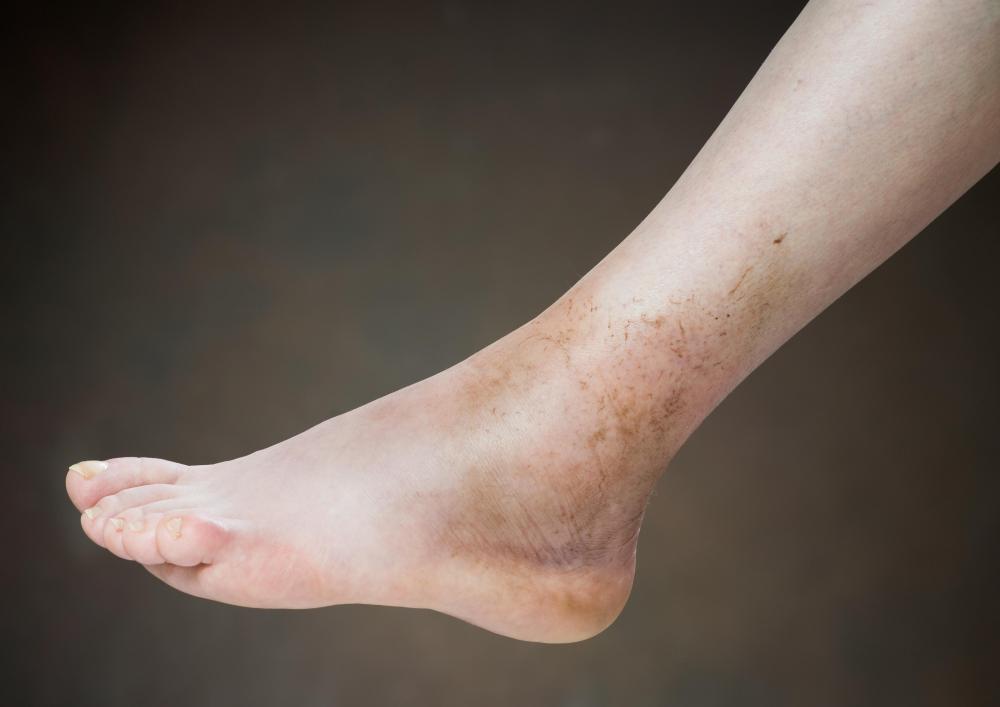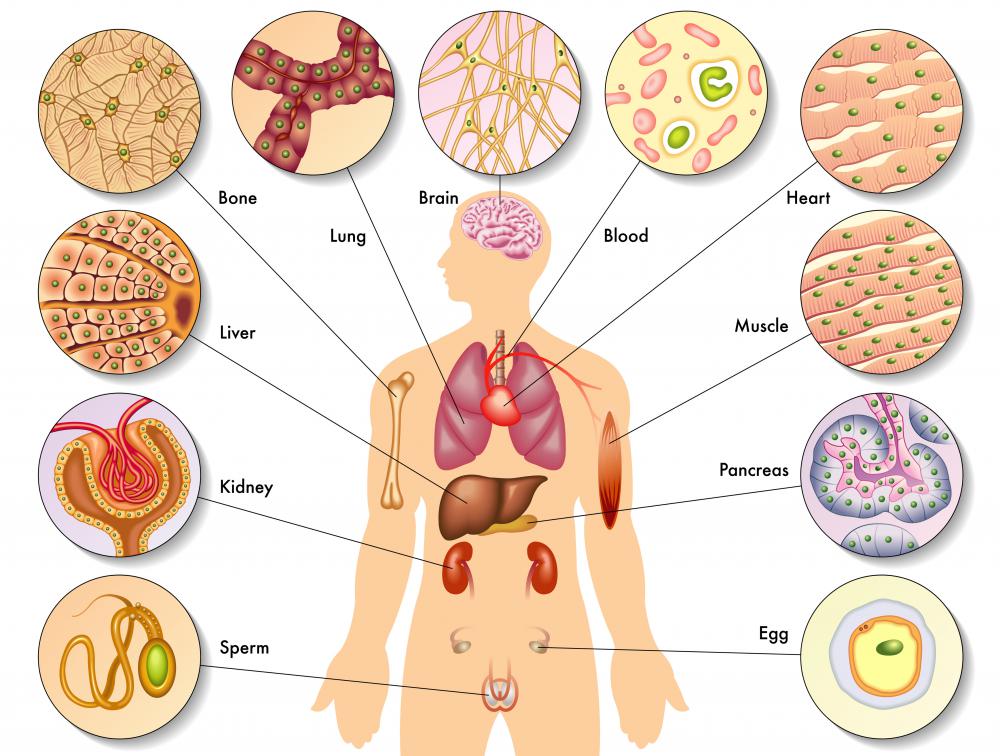At WiseGEEK, we're committed to delivering accurate, trustworthy information. Our expert-authored content is rigorously fact-checked and sourced from credible authorities. Discover how we uphold the highest standards in providing you with reliable knowledge.
What Are the Most Common Neutropenia Symptoms?
Neutropenia is a hematological disorder, or disorder of the blood, in which the afflicted individual has an abnormally low number of a particular type of white blood cell called neutrophils. Neutrophils are the most abundant and most important type of white blood cells and are essential for proper immune system function. Neutropenia symptoms are varied and are generally related to infections that become serious because of the lack of neutrophils; these include stomach ulcers, fevers, and other symptoms typically associated with infection. Neutropenia symptoms may be acute, lasting only a short period of time, or chronic, lasting more than three months.
Minor infections of various forms are not incredibly uncommon, so despite the presence of neutropenia symptoms it can, at times, be difficult to diagnose the condition. Symptoms indicating minor infection, however, may be amplified in individuals with the disorder or infections in general may occur more frequently. The infections that present more regularly or more severely are generally limited to commonly infected areas such as skin, the oral cavity, gastrointestinal tract, urinary tract, and genitalia. In more severe and prolonged cases of neutropenia, however, the infections can spread to lungs or other organs, often with serious consequences.

Neutropenia can be caused by a variety of other illnesses, disorders, and medications, so the symptoms may be accompanied by additional symptoms indicating the presence of another issue. Many bone marrow disorders, for instance, can cause neutropenia in addition to a wide range of other symptoms, including excessive bruising or bleeding, flu-like symptoms, and weight loss. Radiation therapy can have a variety of harmful side-effects including the reduction of neutrophil numbers, so neutropenia symptoms can again be accompanied by symptoms indicative of other problems. In general, treating the underlying problems that bring about the reduction of neutrophil numbers is sufficient to restore the body to a healthy state and to relieve the neutropenia symptoms.

Treatment of neutropenia symptoms is almost always based on treatment of the underlying condition causing neutropenia. In some cases, however, particularly when infections resulting from the disorder become severe, it is also necessary to treat the specific issues that arise. Simply restoring one's neutrophil count to a healthy level is generally not sufficient to completely eradicate a well-established infection, particularly if it has spread through the body to infect major organs. During treatment, various preventative measures may be taken to reduce the risk of possible infection before the neutrophil count is returned to normal.
AS FEATURED ON:
AS FEATURED ON:


















Discussion Comments
@Mykol: Start eating raw white radish (daikon radish) for your lunch. Hopefully, you will overcome the problem of urinary tract infection.
When my mom had breast cancer she had to go through radiation and chemotherapy. She had a neutropenic fever more than once when she was going through this treatment.
Since chemotherapy is often the cause for fevers like this, their main concern was treating her breast cancer.
Medications and procedures can really mess up your blood work and cause your numbers to be abnormal. Usually when you are able to stop these treatments, your blood cell counts will return to normal.
Thankfully, this is what happened with my mom. Even though she is still watched very closely, she is more concerned about the breast cancer returning than a low white blood cell count.
When I hear of someone having a low white blood cell count, the first thing that comes to my mind is leukemia.
One of my friend's daughter was running a fever and complaining of a sore throat. When this didn't go away after a couple of days, they took her to the doctor and they ran blood work.
She wasn't displaying leukemia symptoms other than running a fever which showed her body was fighting some kind of infection.
Her white blood cell counts were low so they did some further testing and diagnosed her with leukemia. There are many different forms of leukemia, and thankfully hers was very treatable.
She still had to go through treatment and chemotherapy. It has been a couple of years since she has finished her treatment and she seems to be doing well.
They have to monitor her blood work on a regular basis and be very cautious if she comes down with any type of fever.
@Mykol - I don't get frequent urinary tract infections but usually my blood works shows a low white blood cell count.
When they first discovered this, they ran all kinds of test but couldn't find anything wrong. My doctor told me that some people naturally have a low white cell count when there is not an underlying disease or problem to account for it.
There is also a difference in the counts for certain ethnic groups of people. The worst thing about having something like this is I am at risk to get infections easier than most people.
I try to keep my immune system strong so I can fight off infections like this. I don't think there is anything I can do to increase my white blood cell count. I just need to concentrate on keeping my immune system as strong as it can be.
Every time I have a urinary tract infection I have neutropenia symptoms. Once I get the infection cleared up, I never have any other problems.
Because I have a history of recurrent urinary tract infections, they often do a urine test and some blood work to check my white blood cell count.
Fortunately nothing else has ever come from this, but it is frustrating getting an infection like this so often.
Sometimes I wonder if I have a weak immune system and might be prone to get more serious infections.
I try to do everything I know of to avoid getting a urinary tract infection, but I don't know if there is anything I can do as far as neutropenic precautions.
When I treat the cause for the neutropenia, everything clears up.
Post your comments